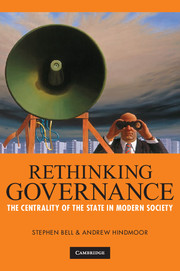Book contents
- Frontmatter
- Contents
- Figures and tables
- Preface
- 1 A state-centric relational approach
- 2 The resilient state
- 3 Metagovernance and state capacity
- 4 Hierarchy and top-down governance
- 5 Governance through persuasion
- 6 Governance through markets and contracts
- 7 Governance through community engagement
- 8 Governance through associations
- 9 Conclusion
- Notes
- Bibliography
- Index
9 - Conclusion
Published online by Cambridge University Press: 05 June 2012
- Frontmatter
- Contents
- Figures and tables
- Preface
- 1 A state-centric relational approach
- 2 The resilient state
- 3 Metagovernance and state capacity
- 4 Hierarchy and top-down governance
- 5 Governance through persuasion
- 6 Governance through markets and contracts
- 7 Governance through community engagement
- 8 Governance through associations
- 9 Conclusion
- Notes
- Bibliography
- Index
Summary
To be governed is to be watched, inspected, spied upon, directed, law-driven, numbered, regulated, enrolled, indoctrinated, preached at, controlled, checked, estimated, valued, censured, commanded.…It is, under pretext of public utility, and in the name of the general interest, to be placed under contribution, drilled, fleeced, exploited, monopolized, extorted from, squeezed, hoaxed, robbed; then, at the slightest resistance, the first word of complaint, to be repressed, fined, vilified, harassed, hunted down, abused, clubbed, disarmed, bound, choked, imprisoned, judged, condemned, shot, deported, sacrificed, sold, betrayed.…That is government; that is its justice; that is its morality.
Pierre-Joseph Proudhon, General Idea of the Revolution in the Nineteenth Century, 1851.States form a part of the backdrop to everyday life. They register births, deaths and marriages. They control immigration, collect taxes, provide public goods and regulate what people can eat, watch and buy. It is true that in some countries communities of people have effectively opted out of the state for religious or political reasons – the Amish in the United States, for example. It is also true that states have sometimes collapsed. Yet for most people in most countries the state remains as central (although perhaps not as objectionable) an actor today as it was for Pierre-Joseph Proudhon in 19th-century France.
Yet those writers who advocate a society-centred perspective on governance argue that governments have lost power and are no longer the ‘cockpit from which society is governed’ (Klijn & Koppenjan, 2000, 136).
- Type
- Chapter
- Information
- Rethinking GovernanceThe Centrality of the State in Modern Society, pp. 186 - 191Publisher: Cambridge University PressPrint publication year: 2009



